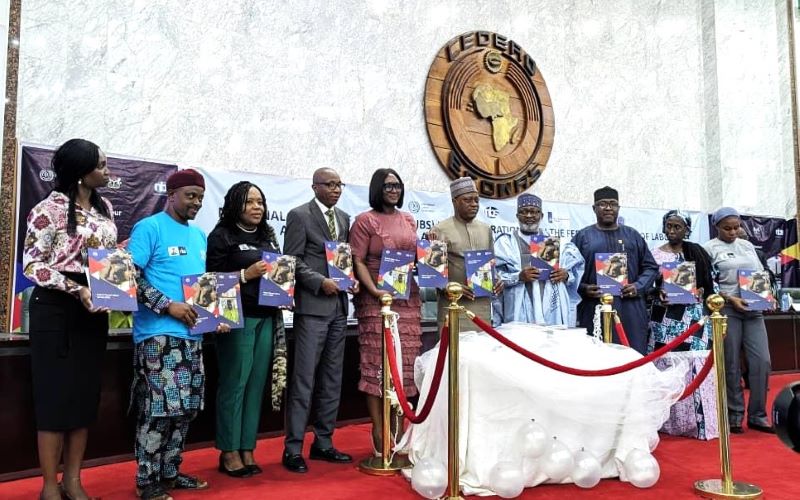The National Bureau of Statistics (NBS), alongside the International Labour Organization (ILO) and other partners, has unveiled the Nigeria Child and Forced Labour Survey Reports 2022.
The reports aim to provide insights into the prevalence of child and forced labour in Nigeria and their impact on children’s well-being and education.
The launch event, held in Abuja, saw the Chief Executive Officer of the National Bureau of Statistics, Adeyemi Adeniran, emphasise the importance of data in addressing the challenges posed by child and forced labour.
Adeniran highlighted that the survey conducted in 2022 serves as a crucial benchmark for assessing the extent of the issue, noting that child and forced labour is a global challenge faced by many developing countries.
‘The 2022 Nigeria Child & Forced Labour Survey Reports is a valid tool to provide verifiable data that will give direction & provide innovative solutions, formulation of policies & programmes towards the elimination of child labour.@nkeiruka_reps, Min @LabourMinNG @NBS_Nigeria pic.twitter.com/0RlrmcPXBD
— United Nations Nigeria (@UN_Nigeria) April 18, 2024
“Addressing this problem in Nigeria requires a multidisciplinary approach with the active participation of key players, including all of us. More hands must be on deck if we have to tackle the menace of child and forced labour.
“Any approach adopted in the fight against child and forced labour requires the development of a mechanism to determine and measure the magnitude, distribution, dimension, and characteristics at both national and state levels,” Adeniran said.

According to the ILO report cited during the event, globally, a significant percentage of children engaged in child labour are out of school, with boys being more affected than girls across all age groups. The report underscores the urgent need for coordinated efforts to tackle this pervasive problem.
617,503 people were in forced labour in their current jobs in 2022.
The prevalence of forced labour in the agricultural sector was 41.1% while that of the service sector was 32.8%
Read the 2022 Nigeria Forced Labour Survey Report here: https://t.co/vAtys9laMv pic.twitter.com/An9Zfss0lB— NBS Nigeria (@NBS_Nigeria) April 18, 2024
The Director of the ILO Country Office for Nigeria, Ghana, Liberia, Sierra Leone, and Liaison Office for ECOWAS, Dr. Vanessa Phala, stressed the importance of data-driven solutions to address child and forced labour effectively.
She highlighted the financial support provided by the United States Department of Labor (USDOL) and the Netherlands Government for projects aimed at combating child and forced labour in Nigeria.
Also Read: Child Labour Elimination: Phase 2 project begins in Nigeria
The representative of the US Embassy in Nigeria, Andray Abrahamian, emphasised the significance of the report’s findings in shaping policy and international efforts to address child and forced labour.
Abrahamian commended the collaboration between the Nigerian government, the ILO, and the US Department of Labor in implementing projects aimed at combating this issue.
Minister of State for the Federal Ministry of Labour and Employment, Nkeiruka Onyejeocha, emphasised the importance of creating an enabling environment to reduce the prevalence of child and forced labour.
“When an enabling environment is created for citizens to thrive through job creation, especially the adults and parents, it is obvious that they can take care of themselves and their children to send them to school and provide for them so they have no need to engage them in child labour, forced labour, or even trafficking.
“Also, it is the agenda of Mr. President to ensure the rule of law is upheld and the rights of citizens are protected to ensure decent work, so that even the children who are within the minimum age for employment can work in decent jobs,” she said.
 The event concluded with calls for concerted efforts and collaboration among stakeholders at all levels to eliminate child and forced labor in Nigeria. Participants expressed hope that the insights provided in the report would guide effective policy actions towards achieving this goal.
The event concluded with calls for concerted efforts and collaboration among stakeholders at all levels to eliminate child and forced labor in Nigeria. Participants expressed hope that the insights provided in the report would guide effective policy actions towards achieving this goal.
In addition to government representatives, goodwill messages were delivered by various organizations, including the FCT Children’s Parliament, NAPTIP, ECOWAS, the National Commission for Persons with Disabilities, and Nigeria’s Ministry of Women Affairs.

